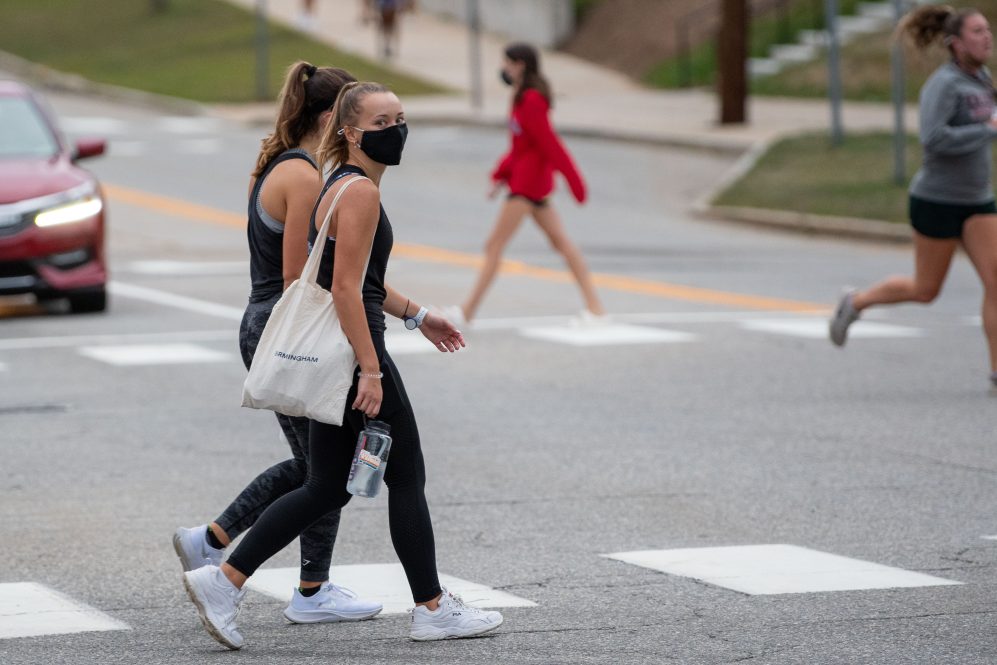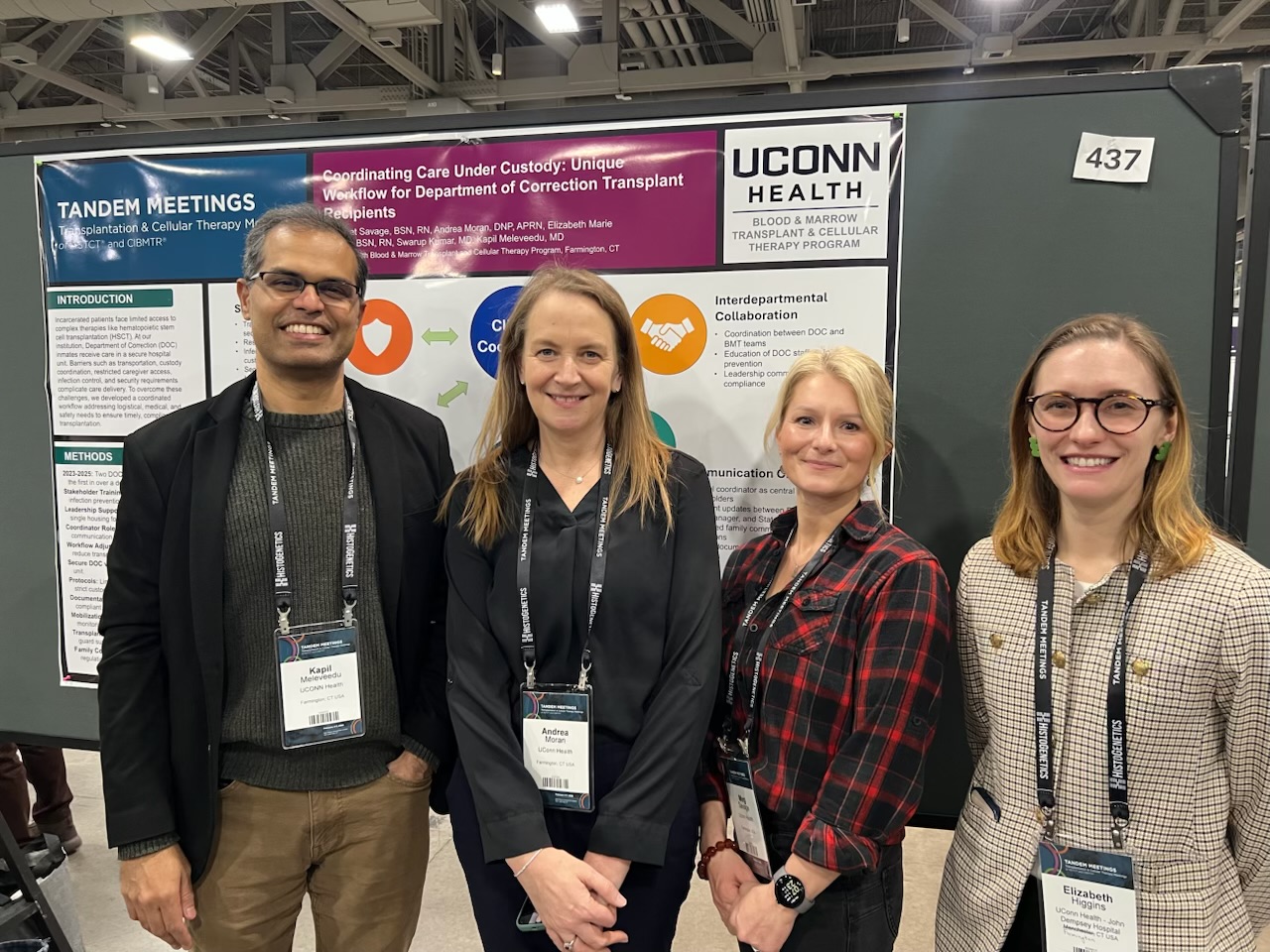Living on a college campus has changed a lot over the last year due to the COVID-19 pandemic, but one UConn program aimed to make sure there were still plenty of opportunities for students to engage in physical activity.
Although students had limited access to standard options like the UConn Student Recreation Center for a period of time, there were still options to get moving, thanks to a collaboration between several University programs through the Exercise is Medicine On Campus (EIM-OC) initiative.
Thanks to the group’s efforts, UConn has earned gold-level recognition with the 2021 COVID-19 Conqueror badge for their creative adaptations to physical activity programming during the pandemic.
“Everyone knows exercise is good for us, but not enough people do it,” says Linda Pescatello, distinguished professor of kinesiology in the College of Agriculture, Health and Natural Resources. “We want to get the students on our campus to be more physically active and experience the many health benefits of physical activity.”
UConn was one of 73 schools to receive a gold designation this year, and one of 126 schools to receive a COVID Conqueror badge. UConn has been acknowledged with gold-level status by the American College of Sports Medicine, which manages the EIM initiative, since 2015.
EIM-OC is a student-led organization at UConn. The group’s mission is to make physical activity assessment a standard part of clinical practice, counting it as a vital sign — just like blood pressure or heart rate — and incorporating exercise when designing treatment plans.
Madison Sides, an undergraduate kinesiology student is the current president.
“We found that with these online classes due to the pandemic, more time was spent sitting down at a desk and less time was spent even just getting up to walk around. We thought that if people were more aware about how much they were moving every day, it could help them to increase their overall activity and get them up from their desk a little more.”
Through a partnership between the Department of Kinesiology, Student Health and Wellness (SHaW), EIM Solution Committee, and Recreation, EIM-OC works to encourage physical activity through multiple channels.
In the fall semester, EIM-OC sponsored a virtual step challenge encouraging students to get out of the dorms and walk around, an activity that would increase physical activity while maintaining social distance. In October 2020, 50 students participated in the challenge. EIM-OC repeated the challenge twice more in November and February 2021. Dozens of students participated both times. EIM-OC also attended the virtual spring involvement fair to talk to students about the organization.
Staying active has been especially important during the pandemic as exercise not only keeps our bodies healthy, but helps people cope with the significant psychological toll of the past year.
“The mental health benefits of exercise have helped with the stress of COVID,” says Christina Day, SHaW’s physical activity counselor and master’s student in kinesiology.
The close collaboration between students, researchers, recreation, and SHaW professionals like medical director Dr. Ellyssa Eror, measures the success of existing and past programs to develop more successful initiatives in the future.
“Not only do we want to offer programs, we want to determine their effectiveness,” says Pescatello.
Be Well at UConn
Pescatello is also an investigator on an ongoing study about students’ physical and mental health during the pandemic through the #UConnBeWell Study. The pandemic has negatively impacted both health aspects as people have largely been confined to their homes and are often cut off from loved ones and social interaction.
College students faced a unique burden during the COVID-19 pandemic as their learning abruptly shifted and largely remained online, physically removing them from the campus community and services provided in that environment. Before the pandemic, 26% of college-aged youth experiences a mental illness and 87% of college students reported they felt overwhelmed according to the American College Health Association.
Students with preexisting mental health conditions are at a higher risk for adverse mental health outcomes from a traumatic experience during college, like the COVID-19 pandemic, especially considering how many students’ treatment systems were disrupted by the transition to remote modalities.
The group, which also includes Saraswathi Bellur-Thandaveshwara in the Department of Communication, Rebecca Acabchuk at the Institute for Collaboration on Health, Intervention & Policy (InCHIP), and Emily Hennessy in the SHARP lab, is currently completing the first iteration of this project, funded by InCHIP’s Rapid Response seed grant program. They surveyed more than 1,000 UConn undergraduates, graduate students, and postdoctoral researchers to determine if those with higher levels of self-regulation and self-compassion exhibit more positive health behavior and less risk behavior during the COVID-19 pandemic.
They surveyed indicators such as management of stress, anxiety, depression, and loneliness, substance use, physical activity, diet, sleep, use of positive coping strategies, and online news consumption.
The group has been awarded additional funding from the Office of the Vice President for Research’s COVID-19 Rapid Start Funding program to continue this work to further examine student coping and factors associated with increased risk behavior, such as not maintaining social distancing and poorer mental and physical health outcomes.
Ultimately, the research team hopes to help universities understand the best ways to respond to future crises and support students.
The EIM Solution Committee also includes, from SHaW: medical director, Dr. Elyssa Eror nutrition coordinator, registered dietitian, and EIM-OC advisor Amy Dunham; outreach director and nurse practitioner Kelley LaFleur; nurse practitioner Coryn Clark; physical activity counselor Christina Day; from recreation: director Jay Frain; associate director of programming Michael Dalfonso; assistant program director of fitness and wellness Lauren Dalton; Student Union interim director Cynthia Costanzo; Linda Pescatello; and kinesiology undergraduate Madison Sides.



